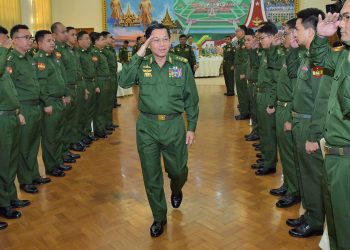RANGOON — The state Buddhist Sangha authority, Ma Ha Na, imposed further restrictions on Burma’s biggest religious nationalist group, the Association for Protection of Race and Religion, better known as Ma Ba Tha, banning the organization from operating under its current name and ordering that their signboards be taken down across the country by July.
It was the second blow by the Buddhist cleric authority after their announcement last year that Ma Ba Tha was not a “lawful monks’ association” as “it was not formed in accordance with the country’s monastic rules.”
Founded in 2014—two years after Burma experienced religiously motivated riots largely targeting the Muslim minority—and now with sub-chapters across the country, Ma Ba Tha has become virtually synonymous with Buddhist nationalism.
Some of its leading members, including U Wirathu, have preached anti-Muslim sermons, claiming that the country’s Buddhist foundations are under assault, that the Muslim population is outpacing the Buddhists, and that Burma needs to be vigilant against fundamentalist influences.
On Tuesday, after a special meeting between Ma Ba Tha leading monks and Ma Ha Na’s senior monks, two clerics from Ma Ba Tha signed the notice, agreeing to adhere to the order.
“According to the 1990 law relating to the Sangha organization and existing laws, action will be taken by the Ministry of Home Affairs against any monks or lay persons that violate the ban,” the statement reads.
The penalties of the Sangha organization law say any monk or novice who violates the law will be punished with a period of imprisonment ranging from six months to three years.
The ban comes at a time Ma Ba Tha was preparing for the fourth anniversary of the organization’s founding, which they were planning to commemorate in Rangoon with members from across the country. They claimed that nearly 10,000 attendants would join the celebration, scheduled for the end of May.
Soon after Ma Ha Na’s announcement on Tuesday, Ma Ba Tha released a statement saying that they would no longer hold the celebration as planned. Instead, they asked all of their members to be present at their Rangoon headquarters to be briefed on Ma Ha Na’s decision.
Ashin Sopaka, a leading Ma Ba Tha monk, told The Irrawaddy that he didn’t think the association had been abolished completely.
“It doesn’t matter whether we have signposts or use the name. We have been protecting race and religion as a mission that we must do,” he said right after the Ma Ha Na’s announcement on Tuesday.
The association was criticized at home and abroad for lobbying for the country’s controversial race and religion laws. Despite their public anti-Muslim preaching, Ma Ba Tha outlived the previous Thein Sein government, which was criticized for turning a blind eye to the association’s actions.
Since it was outlawed by Ma Ha Na in 2016, the association has keeping a lower profile. Recently they announced that they had nothing to do with a midnight confrontation between Buddhist nationalists and Muslim residents near downtown Rangoon.
However, there is speculation that the new bans will not likely have a significant impact on Ma Ba Tha. In late April they reorganized one of their subchapters, “Dhamma Wunthanu Rakhita,” as a “vigilance society” made up largely of laymen and led by senior Ma Ba Tha monks, with the purpose of “protecting” race and religion “when it comes to cases in which Buddhist monks can’t be involved.”
















